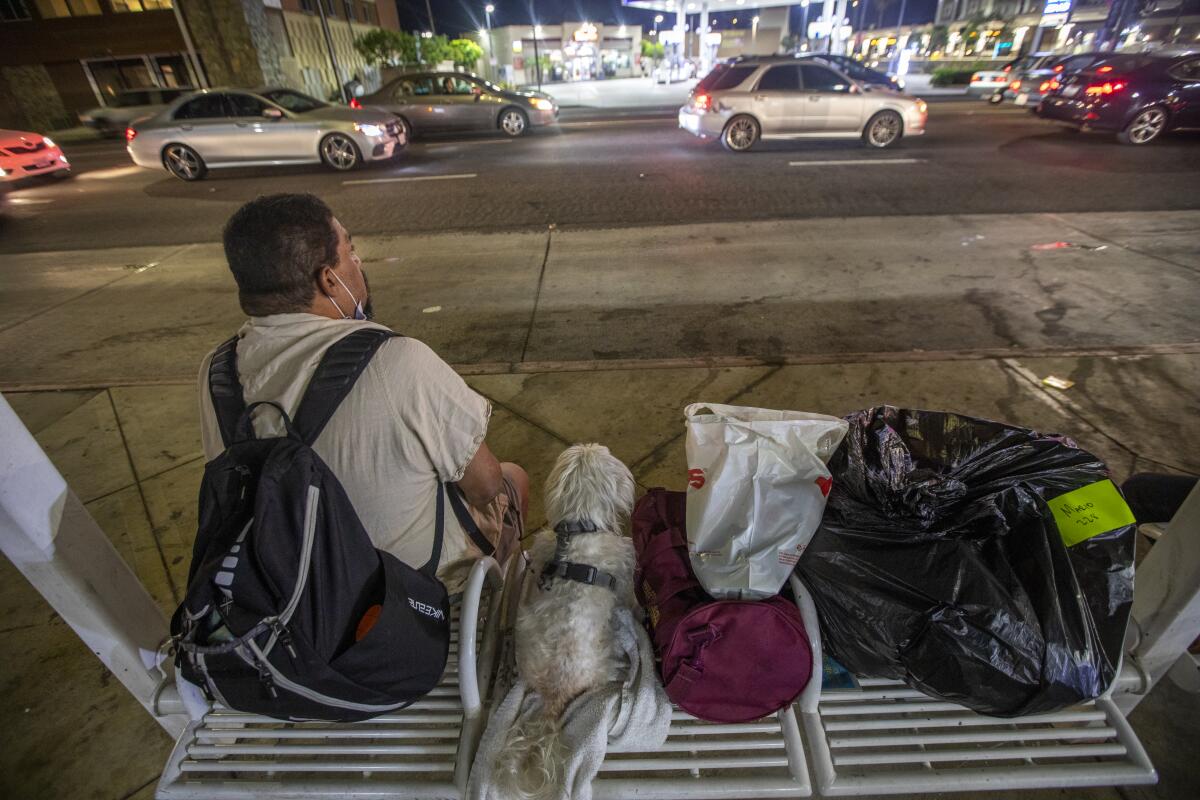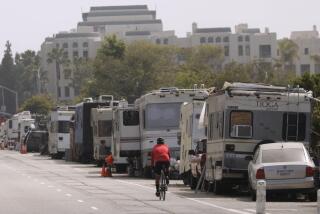Homeless people will face fines, possible arrest in Long Beach crackdown, city official says

- Share via
Long Beach will begin citing and possibly arresting homeless people as part of the city’s effort to crack down on its most problematic encampments.
Those actions will be used as a last resort to remove encampments known to be “difficult spots,” Long Beach Deputy City Manager Teresa Chandler announced in a memo this week.
“This enforcement mechanism will be used as an additional tool when appropriate,” Chandler said, “while continuing to apply a human-centered approach to addressing homelessness.”
City officials said the plan is to identify encampments that pose a public threat or block access to libraries, parks and beaches. It will also target homeless camps where people have repeatedly declined to accept service or shelter.
L.A. City Council looks at restricting RV parking. A refuge for some and bane for others. Tenants in the worst encampments dump trash and sewage on the street.
There were 3,376 people experiencing homelessness tallied in the city’s latest homeless count — down 2.1% from 3,447 in 2023. At least 70% of the population lives outdoors.
In the last year, public works teams have responded to 3,200 encampments in Long Beach, according to the memo. But it did not disclose the cost of the citations or what the length of jail time would be for people who accumulate citations.
Chandler did not respond to a request for comment.
Still, the city plans to show restraint.
“Enforcement of the city’s anti-camping ordinance through issuing of a misdemeanor citation will generally be utilized after multiple attempts of outreach and at the team’s discretion, as appropriate,” the memo said.
The city’s crackdown comes more than a month after Gov. Gavin Newsom issued an executive order directing state agencies to clear encampments from state property and urging counties and cities to do the same.
It’s all the result of the Supreme Court ruling in June that said counties and cities can enforce laws restricting homeless people from sleeping or camping in public spaces, even if there isn’t adequate shelter available.
The ruling was considered a win by the leaders of many cities in the West, where a majority of the nation’s unhoused people live. But for homeless advocates, it was a devastating blow after rulings by the 9th Circuit Court of Appeals that held it was unconstitutional to enforce anti-camping laws against people who had no home and nowhere to sleep.
Advocates feared that the enforcement of anti-camping ordinances would only lead to fines and arrests and make it more difficult to address homelessness.
Long Beach officials acknowledge that enforcement of its anti-camping laws will probably have some unfortunate consequences.
“Fines associated with citations can have destabilizing effects on people who are already extremely low-income,” the memo said. “The experience of receiving fines and forced movement may result in material and psychological harm, lost belongings such as documentation, exacerbated mental and physical health complications and other trauma.”
City officials said the enforcement might cause people to move to other parts of the city or to neighboring cities. It will also create additional challenges for outreach teams that rely on maintaining connections with unhoused people.
L.A. County has seen a decrease of nearly 14% in the homeless population on Skid Row under a project launched a year ago.
Still, city officials say they are doing everything they can to approach the situation as humanely as possible, including having built a new homeless shelter and more housing units.
The memo calls on the city to boost funding for motel vouchers and permanent housing to provide people a route out of the shelter system, as well as to increase staffing at the Homeless Services Bureau and other departments that work with homeless population.
“It is important to remember that this approach builds upon a strong foundation of existing work,” the memo said, “and that the city’s capacity to address homelessness has grown dramatically over the past few years.”
The city plans to review the effectiveness and impact of its enforcement efforts in six months.
More to Read
Sign up for Essential California
The most important California stories and recommendations in your inbox every morning.
You may occasionally receive promotional content from the Los Angeles Times.
![Los Angeles, CA - May 19: Carlos Vargas, left, and Paulina Rubio, members of the harm reduction team from Homeless Outreach Program Integrated Care Systems [HOPICS], a leading homeless services and housing agency, look for drug addicts to help and pass out supplies at a homeless RV encampment along 77th St. in South Los Angeles Friday, May 19, 2023. The team hands out syringes, fentanyl test strips, overdose reversal nose spray and medication to prevent overdoses, infection and disease transmission, including the HIV virus. Fenanyl is particularly insidious because it can be found in all other drugs, especially meth and heroin. The handouts are also meant to reduce infection through broken pipes, which can cut users mouths and open them to infection. . (Allen J. Schaben / Los Angeles Times)](https://ca-times.brightspotcdn.com/dims4/default/0830358/2147483647/strip/true/crop/3900x2600+0+39/resize/840x560!/quality/75/?url=https%3A%2F%2Fcalifornia-times-brightspot.s3.amazonaws.com%2Fe9%2F77%2F4b8bd35d4881a3edec6b945b143b%2F1298639-me-soaring-fentanyl-deaths-24-1-ajs.jpg)











